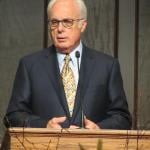2 Chronicles 3:1: Solomon began to build the house of Yahweh in Jerusalem on Mount Moriah, where the Lord had appeared to his father David, at the place that David had prepared, on the threshing floor of Ornan the Jebusite. Naomi gives Ruth specific instructions for her approach to Boaz: “Wash your clothes, anoint yourself, put on your best clothes, and go down to the threshing floor” (3:3). Ruth adorns herself as a bride, but she also dresses herself as... Read more
















